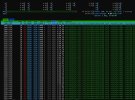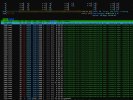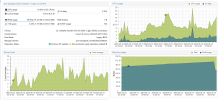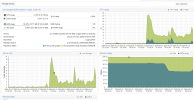Node1 kernel 6.8.4-3
Node2, kernel 6.5.13-5 pinned
Both nodes are used as nfs-storage servers for compute-nodes, so there is no other load on them than nfs-server. PVE is used for OS for unification of infrastructure, basically used it's debian part. Hardware on both nodes differs only on RAM amount and ssd models, all OS settings and network are equal (made with OVS).
Until PVE8.2/6.8 kernel everything was ok. For testing purposes i upgraded Node1 from PVE8.1 to PVE8.2, and it crashed after few days: all RAM was eaten by nothing (full green bar in htop's Mem), OOM killed almost every service, starting from OVS. Hardresetted Node1 via KVM ( only serial console was alive), pinned kernel 6.5.13-5, few days no memory consuming. Before and after crash there was no any kind of load on Node1, no VM disks, nothing.
Then upgraded Node2 from PVE8.1 to PVE8.2 but pinned kernel to 6.5.13-5, there are about 300 qcow2 disks on it (20TB), it is fully healthy.
After few days i unpinned kernel on empty Node1 and returned to 6.8.4-3. 1.5 days passed, 48 of 64G consumed by... nothing again. I'm not kind of bash-fu guy, so there are free command outputs and screens of htop from sick and healthy nodes:
All time ranges are not exact, approximate.
Forum did not allow me to insert part of Node1's dmesg before hard reset from KVM as it is too long, attached in the file.
Any help with suggestions and diagnostics would be appreciated...
proxmox-ve: 8.2.0 (running kernel: 6.8.4-3-pve)
pve-manager: 8.2.2 (running version: 8.2.2/9355359cd7afbae4)
proxmox-kernel-helper: 8.1.0
proxmox-kernel-6.8: 6.8.4-3
proxmox-kernel-6.8.4-3-pve-signed: 6.8.4-3
proxmox-kernel-6.8.4-2-pve-signed: 6.8.4-2
proxmox-kernel-6.5.13-5-pve-signed: 6.5.13-5
proxmox-kernel-6.5: 6.5.13-5
ceph-fuse: 17.2.7-pve3
corosync: 3.1.7-pve3
criu: 3.17.1-2
glusterfs-client: 10.3-5
ifupdown2: 3.2.0-1+pmx8
ksm-control-daemon: residual config
ksmtuned: 4.20150326+b1
libjs-extjs: 7.0.0-4
libknet1: 1.28-pve1
libproxmox-acme-perl: 1.5.1
libproxmox-backup-qemu0: 1.4.1
libproxmox-rs-perl: 0.3.3
libpve-access-control: 8.1.4
libpve-apiclient-perl: 3.3.2
libpve-cluster-api-perl: 8.0.6
libpve-cluster-perl: 8.0.6
libpve-common-perl: 8.2.1
libpve-guest-common-perl: 5.1.1
libpve-http-server-perl: 5.1.0
libpve-network-perl: 0.9.8
libpve-rs-perl: 0.8.8
libpve-storage-perl: 8.2.1
libspice-server1: 0.15.1-1
lvm2: 2.03.16-2
lxc-pve: 6.0.0-1
lxcfs: 6.0.0-pve2
novnc-pve: 1.4.0-3
openvswitch-switch: 3.1.0-2+deb12u1
proxmox-backup-client: 3.2.2-1
proxmox-backup-file-restore: 3.2.2-1
proxmox-kernel-helper: 8.1.0
proxmox-mail-forward: 0.2.3
proxmox-mini-journalreader: 1.4.0
proxmox-widget-toolkit: 4.2.3
pve-cluster: 8.0.6
pve-container: 5.1.10
pve-docs: 8.2.2
pve-edk2-firmware: 4.2023.08-4
pve-esxi-import-tools: 0.7.0
pve-firewall: 5.0.7
pve-firmware: 3.11-1
pve-ha-manager: 4.0.4
pve-i18n: 3.2.2
pve-qemu-kvm: 8.1.5-6
pve-xtermjs: 5.3.0-3
qemu-server: 8.2.1
smartmontools: 7.3-pve1
spiceterm: 3.3.0
swtpm: 0.8.0+pve1
vncterm: 1.8.0
zfsutils-linux: 2.2.3-pve2
pve-manager: 8.2.2 (running version: 8.2.2/9355359cd7afbae4)
proxmox-kernel-helper: 8.1.0
proxmox-kernel-6.8: 6.8.4-3
proxmox-kernel-6.8.4-3-pve-signed: 6.8.4-3
proxmox-kernel-6.8.4-2-pve-signed: 6.8.4-2
proxmox-kernel-6.5.13-5-pve-signed: 6.5.13-5
proxmox-kernel-6.5: 6.5.13-5
ceph-fuse: 17.2.7-pve3
corosync: 3.1.7-pve3
criu: 3.17.1-2
glusterfs-client: 10.3-5
ifupdown2: 3.2.0-1+pmx8
ksm-control-daemon: residual config
ksmtuned: 4.20150326+b1
libjs-extjs: 7.0.0-4
libknet1: 1.28-pve1
libproxmox-acme-perl: 1.5.1
libproxmox-backup-qemu0: 1.4.1
libproxmox-rs-perl: 0.3.3
libpve-access-control: 8.1.4
libpve-apiclient-perl: 3.3.2
libpve-cluster-api-perl: 8.0.6
libpve-cluster-perl: 8.0.6
libpve-common-perl: 8.2.1
libpve-guest-common-perl: 5.1.1
libpve-http-server-perl: 5.1.0
libpve-network-perl: 0.9.8
libpve-rs-perl: 0.8.8
libpve-storage-perl: 8.2.1
libspice-server1: 0.15.1-1
lvm2: 2.03.16-2
lxc-pve: 6.0.0-1
lxcfs: 6.0.0-pve2
novnc-pve: 1.4.0-3
openvswitch-switch: 3.1.0-2+deb12u1
proxmox-backup-client: 3.2.2-1
proxmox-backup-file-restore: 3.2.2-1
proxmox-kernel-helper: 8.1.0
proxmox-mail-forward: 0.2.3
proxmox-mini-journalreader: 1.4.0
proxmox-widget-toolkit: 4.2.3
pve-cluster: 8.0.6
pve-container: 5.1.10
pve-docs: 8.2.2
pve-edk2-firmware: 4.2023.08-4
pve-esxi-import-tools: 0.7.0
pve-firewall: 5.0.7
pve-firmware: 3.11-1
pve-ha-manager: 4.0.4
pve-i18n: 3.2.2
pve-qemu-kvm: 8.1.5-6
pve-xtermjs: 5.3.0-3
qemu-server: 8.2.1
smartmontools: 7.3-pve1
spiceterm: 3.3.0
swtpm: 0.8.0+pve1
vncterm: 1.8.0
zfsutils-linux: 2.2.3-pve2
Node2, kernel 6.5.13-5 pinned
proxmox-ve: 8.2.0 (running kernel: 6.5.13-5-pve)
pve-manager: 8.2.2 (running version: 8.2.2/9355359cd7afbae4)
proxmox-kernel-helper: 8.1.0
proxmox-kernel-6.8: 6.8.4-2
proxmox-kernel-6.8.4-2-pve-signed: 6.8.4-2
proxmox-kernel-6.5.13-5-pve-signed: 6.5.13-5
proxmox-kernel-6.5: 6.5.13-5
proxmox-kernel-6.5.13-1-pve-signed: 6.5.13-1
proxmox-kernel-6.5.11-8-pve-signed: 6.5.11-8
ceph-fuse: 17.2.7-pve3
corosync: 3.1.7-pve3
criu: 3.17.1-2
glusterfs-client: 10.3-5
ifupdown2: 3.2.0-1+pmx8
ksm-control-daemon: residual config
ksmtuned: 4.20150326+b1
libjs-extjs: 7.0.0-4
libknet1: 1.28-pve1
libproxmox-acme-perl: 1.5.1
libproxmox-backup-qemu0: 1.4.1
libproxmox-rs-perl: 0.3.3
libpve-access-control: 8.1.4
libpve-apiclient-perl: 3.3.2
libpve-cluster-api-perl: 8.0.6
libpve-cluster-perl: 8.0.6
libpve-common-perl: 8.2.1
libpve-guest-common-perl: 5.1.1
libpve-http-server-perl: 5.1.0
libpve-network-perl: 0.9.8
libpve-rs-perl: 0.8.8
libpve-storage-perl: 8.2.1
libspice-server1: 0.15.1-1
lvm2: 2.03.16-2
lxc-pve: 6.0.0-1
lxcfs: 6.0.0-pve2
novnc-pve: 1.4.0-3
openvswitch-switch: 3.1.0-2+deb12u1
proxmox-backup-client: 3.2.2-1
proxmox-backup-file-restore: 3.2.2-1
proxmox-kernel-helper: 8.1.0
proxmox-mail-forward: 0.2.3
proxmox-mini-journalreader: 1.4.0
proxmox-offline-mirror-helper: 0.6.6
proxmox-widget-toolkit: 4.2.3
pve-cluster: 8.0.6
pve-container: 5.0.11
pve-docs: 8.2.2
pve-edk2-firmware: 4.2023.08-4
pve-esxi-import-tools: 0.7.0
pve-firewall: 5.0.5
pve-firmware: 3.11-1
pve-ha-manager: 4.0.4
pve-i18n: 3.2.2
pve-qemu-kvm: 8.1.5-5
pve-xtermjs: 5.3.0-3
qemu-server: 8.2.1
smartmontools: 7.3-pve1
spiceterm: 3.3.0
swtpm: 0.8.0+pve1
vncterm: 1.8.0
zfsutils-linux: 2.2.3-pve2
pve-manager: 8.2.2 (running version: 8.2.2/9355359cd7afbae4)
proxmox-kernel-helper: 8.1.0
proxmox-kernel-6.8: 6.8.4-2
proxmox-kernel-6.8.4-2-pve-signed: 6.8.4-2
proxmox-kernel-6.5.13-5-pve-signed: 6.5.13-5
proxmox-kernel-6.5: 6.5.13-5
proxmox-kernel-6.5.13-1-pve-signed: 6.5.13-1
proxmox-kernel-6.5.11-8-pve-signed: 6.5.11-8
ceph-fuse: 17.2.7-pve3
corosync: 3.1.7-pve3
criu: 3.17.1-2
glusterfs-client: 10.3-5
ifupdown2: 3.2.0-1+pmx8
ksm-control-daemon: residual config
ksmtuned: 4.20150326+b1
libjs-extjs: 7.0.0-4
libknet1: 1.28-pve1
libproxmox-acme-perl: 1.5.1
libproxmox-backup-qemu0: 1.4.1
libproxmox-rs-perl: 0.3.3
libpve-access-control: 8.1.4
libpve-apiclient-perl: 3.3.2
libpve-cluster-api-perl: 8.0.6
libpve-cluster-perl: 8.0.6
libpve-common-perl: 8.2.1
libpve-guest-common-perl: 5.1.1
libpve-http-server-perl: 5.1.0
libpve-network-perl: 0.9.8
libpve-rs-perl: 0.8.8
libpve-storage-perl: 8.2.1
libspice-server1: 0.15.1-1
lvm2: 2.03.16-2
lxc-pve: 6.0.0-1
lxcfs: 6.0.0-pve2
novnc-pve: 1.4.0-3
openvswitch-switch: 3.1.0-2+deb12u1
proxmox-backup-client: 3.2.2-1
proxmox-backup-file-restore: 3.2.2-1
proxmox-kernel-helper: 8.1.0
proxmox-mail-forward: 0.2.3
proxmox-mini-journalreader: 1.4.0
proxmox-offline-mirror-helper: 0.6.6
proxmox-widget-toolkit: 4.2.3
pve-cluster: 8.0.6
pve-container: 5.0.11
pve-docs: 8.2.2
pve-edk2-firmware: 4.2023.08-4
pve-esxi-import-tools: 0.7.0
pve-firewall: 5.0.5
pve-firmware: 3.11-1
pve-ha-manager: 4.0.4
pve-i18n: 3.2.2
pve-qemu-kvm: 8.1.5-5
pve-xtermjs: 5.3.0-3
qemu-server: 8.2.1
smartmontools: 7.3-pve1
spiceterm: 3.3.0
swtpm: 0.8.0+pve1
vncterm: 1.8.0
zfsutils-linux: 2.2.3-pve2
Both nodes are used as nfs-storage servers for compute-nodes, so there is no other load on them than nfs-server. PVE is used for OS for unification of infrastructure, basically used it's debian part. Hardware on both nodes differs only on RAM amount and ssd models, all OS settings and network are equal (made with OVS).
Until PVE8.2/6.8 kernel everything was ok. For testing purposes i upgraded Node1 from PVE8.1 to PVE8.2, and it crashed after few days: all RAM was eaten by nothing (full green bar in htop's Mem), OOM killed almost every service, starting from OVS. Hardresetted Node1 via KVM ( only serial console was alive), pinned kernel 6.5.13-5, few days no memory consuming. Before and after crash there was no any kind of load on Node1, no VM disks, nothing.
Then upgraded Node2 from PVE8.1 to PVE8.2 but pinned kernel to 6.5.13-5, there are about 300 qcow2 disks on it (20TB), it is fully healthy.
After few days i unpinned kernel on empty Node1 and returned to 6.8.4-3. 1.5 days passed, 48 of 64G consumed by... nothing again. I'm not kind of bash-fu guy, so there are free command outputs and screens of htop from sick and healthy nodes:
└─# free -m
Bash:
total used free shared buff/cache available
Mem: 64187 50711 13188 35 968 13475
Swap: 65535 0 65535└─# free -m
Bash:
total used free shared buff/cache available
Mem: 48050 5774 1868 9 41017 42275
Swap: 8191 691 7500Forum did not allow me to insert part of Node1's dmesg before hard reset from KVM as it is too long, attached in the file.
Any help with suggestions and diagnostics would be appreciated...
Attachments
Last edited:





